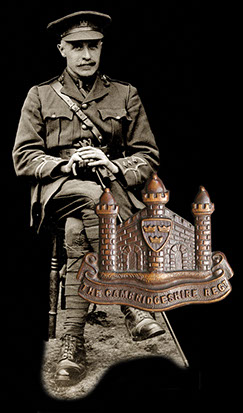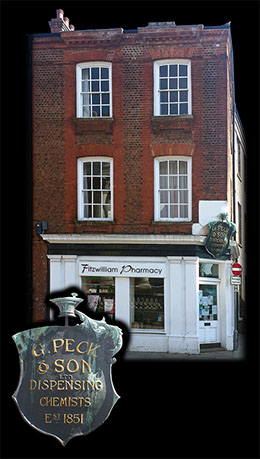A Pharmacist Goes to War – Ernest Saville Peck
Some officers commissioned into the Cambridgeshire Regiment never saw front line active service, but their talents were recognised for important work towards the war effort. One of several such men was the Cambridge pharmacist Ernest Saville Peck.
Born in 1866 in Cambridge, he was the son of George and Edith Peck, of Fitzwilliam Street. After attending the city’s Perse School, he followed in his chemist father’s footsteps by becoming an apprentice in the family pharmacy in Trumpington Street. He went on to study pharmaceutical chemistry and at Fitzwilliam Hall, Cambridge, and gained a BA in 1894 and an MA in 1897. He was also appointed an examiner for the British Pharmaceutical Society in 1899.
Joining the 3rd (Volunteer) Btn, The Suffolk Regt at Cambridge in 1902, he was promoted Lieutenant in 1904, the same year that he took over the family pharmacy on his father’s death. Transferred from the Volunteers to the new Cambridgeshire Regt (TF) in 1908, he resigned his commission a year later.
The 1911 census shows Ernest as a 44-year-old chemist, with his wife Rachel and children in Hills Road, Cambridge. Soon after the outbreak of the First World War, Ernest was commissioned as a Lieutenant on the General List (TF Reserve) in October 1914, and promoted Temporary Captain a month later. He was given command of the regimental depot in Corn Exchange Street, which oversaw the influx of recruits for the new 2/1st Btn. From February onwards he also nominally commanded the 3/1st Btn as it was being formed. He remained at the depot until June 1915 when he was appointed second in command of the now fully established 3/1st Btn and promoted to T/Major. His job at the depot was given to T/Capt Jack Ollard, who had been invalided home from the Western Front.
It was at this stage that the Army decided to use his talents as a chemist and he was seconded to the Anti-Gas School in April 1917 and reverted to his rank of Captain. Developing an expertise in chemical warfare, he established an Anti-Gas School at Halton Camp, Tring. Later in the year he became an instructor while employed with a British Military Mission, again being promoted to T/Major, and made visits overseas. In 1918 he advised the US Army in anti-gas measures. Relinquishing the rank of T/Major in November 1918, he resumed the rank of Captain and was restored to establishment of Cambs Regt until 1920.
His work on chemical warfare earned him the Royal Pharmaceutical Society’s Harrison Memorial Medal, and he was officially mentioned by Secretary of State for War for valuable war service.
After the war he resumed his civilian occupation as head of G Peck and Son, chemists, of Cambridge. A member of the council of the Royal Pharmaceutical Society from 1922 to 1943, he was its vice-president from 1933-35 and president in 1935/36. He also served as a member of Cambridge Borough Council from 1924 to 1947, was Mayor in 1937/38 and made an Alderman in 1938. He was also appointed a Deputy Lord Lieutenant of Cambridgeshire in 1939 alongside Lt. Col Archer TD. Ernest died on January 16th, 1955 at the Hope Nursing Home, Cambridge.
Further information on the life of Ernest Peck can be found on the Fitzwilliam Museum Website by clicking here.

Ernest while commanding the depot in 1915.

The Peck family business in Cambridge.

This site went live on the 14th February 2015 to mark 100 years since the 1/1st Cambs went off to war.
WE WILL REMEMBER THEM
Email us: cambsregt@gmail.com
Copyright 2015, 2016, 2017, 2018, 2019 by Felix Jackson. The information and images on this site should not be reproduced without prior permission.